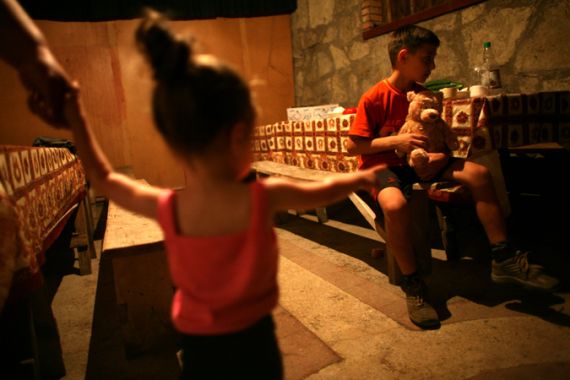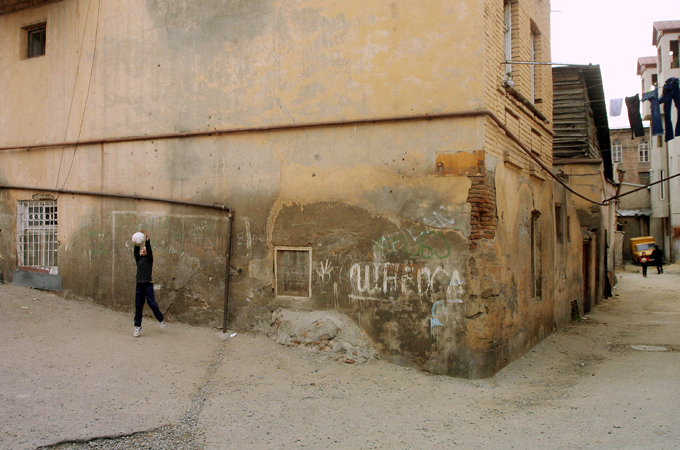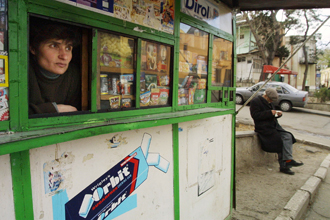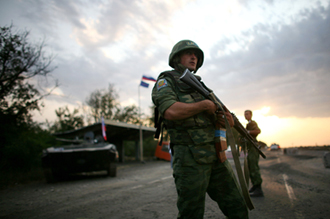Westernising Georgia faces snags
A Georgian scheme to supplant Russian with English as a second language is facing the barriers it aims to dismantle.

 |
| All Georgian children will learn English from their first year in school from September 2011 [GALLO/GETTY] |
When California-native Jiayi Zhou teaches classes of Georgian pupils the cultural boundaries she is there to dismantle are palpable.
“The students are really eager and really excited to see somebody from a Western culture. Even though I am ethnically Chinese,” she said.
Keep reading
list of 4 items‘Triple spending’: Zimbabweans bear cost of changing to new ZiG currency
‘We share with rats’: Neglect, empty promises for S African hostel-dwellers
Thirty years waiting for a house: South Africa’s ‘backyard’ dwellers
“But it is somebody in their school who has travelled all this way. That creates a keen interest.”
Zhou works in a school on the outskirts of Tbilisi, the Georgian capital, where many of the students have no textbooks.
She gives classes with the aid of a Georgian English teacher in order to avoid difficulties deriving from her limited grasp of the Georgian language and her pupils’ minimal knowledge of English.
Zhou lives with a local host family in an area of suburban high-rises, unreliable water and electricity supplies and high unemployment.
Russian hegemony
She is in Georgia as part of a government initiative to have English replace Russian as the county’s second language within the next five years.
Running since September 2010, the programme has brought more than 1,000 native-English speakers to Georgian public schools, and aims to have 1,500 in place by the start of the new school year in September. By that time English will be mandatory in all Georgian schools from the first grade.
Having been ruled for 70 years by the Soviet Union, many Georgians speak at least some Russian. Russia supports the Georgian break-away regions of South Ossetia and Abkhazia, over which the two countries fought a war in 2008and Moscow’s so-called peacekeeping forces remain in these areas.
As a bulwark against fears of Russian hegemony Georgia has allowed citizens of the bordering Russian North Caucuses to move freely in and out of the country and launched a Russian-language TV station transmitting to the same region.
The teaching programme is another of Georgia’s attempts to distance itself from perceived Russian jingoism via soft power.
Tbilisi adds that the scheme will allow Georgian graduates to compete in international markets and, with resources in Georgia being limited, aid self-education via the internet.
Ultimately they hope this will help develop the economy. Georgia’s 4.5 million people earn an average of $4,800 annually – the 152nd lowest in the world. Thirty-one per cent of people in the mountainous nation live below the poverty line.
That has not prevented Georgians from providing their traditional hospitality, typically involving invitations to eat and drink excessively, to American, Canadian and British teachers, while accepting them into their societal makeup.
Cultural conflict
 |
| Georgian life is typified by a traditional religious culture and poor resources [GALLO/GETTY] |
Yet, the one week of cultural training teachers are given on arrival in the country appears to have been little preparation for the societal leaps participants are expected to make.
Jason Rice, a 34-year-old from Michigan, who left the programme after his initial three month contract expired, said that the tight bonds of family and community became problematic.
“One [of the reasons I left] was that I was too popular. Due to a tragedy in my first host family the programme moved me to another family. When I returned for the second semester, my first host family requested that I return to them. This coincided with some actions that make me think that it was the cause of some bad feelings with the second host family, ” Rice said.
“I did not want to make a choice between the two because they had both been very kind to me, were well respected in the community and the school, and either choice would result in an impeded ability to teach and live comfortably there.”
Attitudes toward homosexuality in this deeply religious culture have caused some friction between participants and parts of local society, while foreign females have been the focus of the stringent if sporadic advances of Georgian men who continue to play out traditional gender roles.
Zhou said: “In certain mentalities they are quite conservative. And I have had bad experiences with Georgian men. In terms of my host family, we have a language barrier a little bit. In my house is one of the eighth grade students of my school and her English is very limited still and she is the only one who speaks a lot of English.”
Rice believes that as one of the initial group of English teachers coming to the country, it was inevitable that he would face stereotyping.
“I hope Georgians were able to learn that people are individuals and not just a culture. I did not seem to be what they were expecting. Americans, in their minds, were supposed to think and act a certain way, and because I didn’t fit that, they appeared to not really know how to deal with that,” he said.
There have been at least three sackings of teachers, including one for perceived slighting of the programme.
‘Improved education’
Bahamian Nicole Bedford spent three months teaching in Kharagauli in the west of the country, as well as in Tbilisi. Last January the programme told her that she could not return to teach after a school vacation due to uncomplimentary comments she made on Facebook. Bedford said that these remarks had spoken of programme coordinators’ poor professionalism and her interaction with Georgian society.
“I said things about my experience, the racism that I had experienced and other things,” Bedford said.
“They sent me an email saying that I was being derogatory about their culture by saying these things on Facebook and they don’t want someone like that on their programme. So I got fired for talking about my experience on Facebook.”
Dimitri Shashkini, Georgia’s minister of education and science, said that there have been only a few such issues so far in an otherwise hugely beneficial programme.
“We don’t see any big problems of any conflict between cultures. There are some reports that we have seen and we have made some reaction on this. But there were no major problems.”
Rather he said that there have been improvements in English-language learning and a significant step forward in the ratings of Georgian teachers of English.
Shashkini is also explicit regarding the Russian angle, saying that teachers bring a positive alternative culture.
“After classes they play a very important role in the local society. For example, there is a teacher who is in a village school that is exactly 100m from the Russian occupation army.
“The children from this school can see Russian occupants from the windows of their school. And this teacher lives in this village and there is a huge impact on the local community when they see the person from the United States, as a woman too, making a difference in the community.”
Other priorities
 |
| Russia’s presence in break-away regions has motivated Tbilisi to look towards the West [GALLO/GETTY] |
Despite the benefits, some question whether the programme is an appropriate priority for a country with such limited funds.
On top of board, foreign teachers earn roughly $300 per month – about twice as much as local teachers who typically survive via providing private tuition.
Zhou said: “On a superficial level the president has put in this programme to make it seem like a big difference will happen when they invite all these American teachers. But it is a long way coming. People need jobs first, there’s really high unemployment and it is still poor.
“This is taking government funds and giving it to people who, as much as they are trying, find it is really difficult to make a tremendous difference at school. We can’t speak their language. We are always tied to a Georgian co-teacher who translates for you.”
However, to Shashkini’s mind the programme is encouraging Georgia’s primary resource, whose growth will eliminate such issues.
“Georgia doesn’t have oil or natural gas,” Shashkini said. “The resource that we have is our human potential. It is the known value of this country.
“I have seen a child is asked why the English language is so important and he answers that it gives me the chance to get better job, more salary, and that I think that it is my future.”
Follow Rhodri Davies on Twitter: @rhodrirdavies